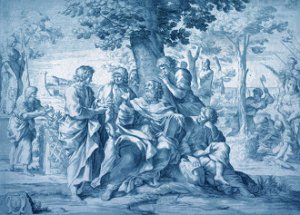
Arquivo para June 17th, 2025
Neosophism, enmity and violence
The modern polis, a cult of Western civilization in crisis, was born from the need for politicians who could manage the public good with virtues (aretê), true knowledge (episteme) and justice above what is advantageous and beneficial to a given group.
need for politicians who could manage the public good with virtues (aretê), true knowledge (episteme) and justice above what is advantageous and beneficial to a given group.
Socrates, seen in the text Plato’s Republic, was the method of dialogue (dialectics, but in the Greek sense) where the power of argumentation and maieutics, “give birth” to knowledge.
This is how Plato’s Theaetetus (see our post) discusses relativism and the polis; dialogue is the Socratic method of investigation, including the analysis between reason and sensation, and had as its main objective to overcome the sophist thought that only justified power, despite any virtue (moral or ethical) and any reasonable concept of justice.
This is why Theaetetus is considered the first classic text on relativism, and dialogue as a Socratic method of overcoming the dichotomies of oligarchic forms of power also had the idea of overcoming all forms of relativism that involved the sovereigns’ thirst for power. Thus, Plato’s Republic should be reread by contemporary politicians and they could avoid what we call neo-sophisms, what is valid for power is not valid for the people, for example, what is advantageous can be found in the epistemology of Protagoras, where according to some commentators (Chappell, 2005) he discusses the “advantageous” and political and moral prudence, and are largely applicable to contemporary politics.
The sense of what is advantageous, Socrates grants to the subjects of Protagoras’ epistemology the possibility of sustaining their convictions according to the particular or social demand in the cities, while at the same time seeking to guarantee for the state a minimum sphere of values around what is beneficial or harmful, the emphasis on minimum here is for good understanding.
The divorce between justice and benefit according to the commentator cited (Chappel, 2005), is very much in the order of the day because it is not very different between the current political and moral prudence, here I include what leads to violence in modern society, not only the lack of prudence but also what modern politics considers as fair the benefits and immoralities of the circle of power.
Socrates was led to martyrdom, not because of worshiping false gods, this was the sophist argument (it is also valid to a certain extent for the present day), but for wanting to “give birth” to true knowledge, justice and public morality, hence the violence of the power of the oligarchs and their kings. Of course, humanity has walked 2 thousand years from there to here, but the current polis is experiencing a crisis similar to that of Greek cities, and violence seems institutionalized and unbridled.
Chappel, T. (2005) Reading Plato’s Theaetetus. Indianápolis/Cambridge: Hackett.
Plato. Teeteto.(2010) Trad. Adriana Manuela Nogueira e Marcelo Boeri. LisboN: Fundação Calouste Gulbenkian.

